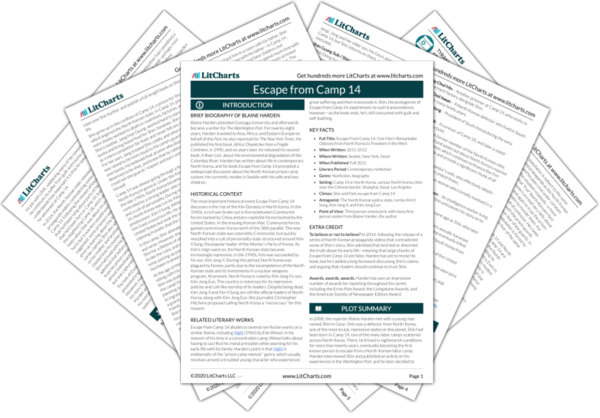Although the majority of Escape From Camp 14 is about Shin In Geun and North Korea in general, the book also studies the way that North Korea is perceived around the world. In particular, it poses a serious question: why haven’t people been more outspoken in their opposition to the North Korean dictatorship in general and North Korean prison camps in particular? In trying to answer this question, Escape From Camp 14 makes some sobering points about the public’s indifference to suffering and about what it takes for activists to get a human rights movement started.
The book’s main argument about human rights activism is also its most depressing: much of the time, people are simply indifferent to the pain of others when it doesn’t directly affect them. In other countries, there’s remarkably little public interest in the brutal prison camps where Shin grew up. In South Korea, the book notes, the public tends to view the North Korean leaders as nuisances, rather than full-fledged war criminals. Furthermore, polls suggest that the bulk of South Koreans view North Korean defectors—many of whom fled from unspeakable cruelty—as irritations, not human beings in need of help. In the United States, a country that prides itself on its human rights record, the public is also often indifferent to the question of the North Korean prison camps. There are people who’ve gone out of their way to campaign against the prison camps and treat North Koreans with compassion and sympathy, but the book suggests that many of these people are personally connected with North Korea in some way; for example, after he escapes to China, Shin goes out of his way to protect two other North Korean defectors, even though his actions endanger his own situation. This suggests that, often times, people remain indifferent to the suffering of other people unless they feel a specific connection with those other people—for example, a common nationality.
But it’s not enough to say that most people are indifferent to suffering. Escape From Camp 14 paints a pessimistic picture of the public’s indifference to North Korean prison camps, but it also suggest some ways that human rights movements could succeed. Above all, the book suggests, a successful activist movement needs bold, charismatic leaders and supporters. At one point, Harden speculates that the reason North Korea’s prison camps haven’t attracted much outrage is that, so far, no celebrities have fought against them. As strange as it may seem, Harden’s point is serious: often, activist movements succeed because famous people draw the public’s attention toward the issue. Activist movements benefit from leaders who can use their celebrity, charisma, or eloquence to forge a strong emotional bond between the public and the persecuted. Put another way, activists need to convince people to think of the prisoners in North Korean camps as their close friends and allies—not distant, alien beings living on the other side of the planet. By speaking with passion and conviction, the right speaker could jolt people out of their indifference and encourage them to fight for what’s right. If enough people are passionate about North Korea’s human rights violations, the book cautiously suggests, then the world’s leaders would be more likely to make human rights a high political priority (instead of largely ignoring the issue, as they’ve been doing for the last forty years). In the end, it’s unclear if Shin is brave enough to step up and become the passionate, charismatic leader the movement desperately needs.
Activism and Indifference ThemeTracker

Activism and Indifference Quotes in Escape from Camp 14
Shin's story seemed to get under the skin of ordinary readers. They wrote letters and sent e-mails, offering money, housing, and prayers.
He began thinking about escape. Park made those thoughts possible. He changed the way Shin connected with other people. Their friendship broke a lifelong pattern—stretching back to Shin's malignant relationship with his mother—of wariness and betrayal.
[Shin] was fetching water from a brook near the farm when he met two other North Korean defectors. They were hungry and cold and living in an abandoned shack in the woods not far from the pig farm. Shin asked the Chinese farmer to help them out, and he did so, but with a reluctance and a resentment that Shin was slow to notice.
Shin exaggerated the South's lack of concern about the North, but he had a valid point. It's a blind spot that baffles local and international human rights groups. Overwhelming evidence of continuing atrocities inside the North's labor camps has done little to rouse the South Korean public.
[Shin] told a story about his escape that was short, sketchy, sanitized—and largely incomprehensible to someone who was not steeped in the details of his life.
"My story can be very heartbreaking," he said, wrapping up the session after about fifteen minutes. "I don't want you to be depressed." He had bored and baffled his audience.
That evening, his listeners squirmed in their pews, their faces showing discomfort, disgust, anger, and shock. Some faces were stained with tears. When Shin was finished, when he told the congregation that one man, if he refuses to be silenced, could help free the tens of thousands who remain in North Korean labor camps, the church exploded in applause.
In that speech, if not yet in his life, Shin had seized control of his past.
















